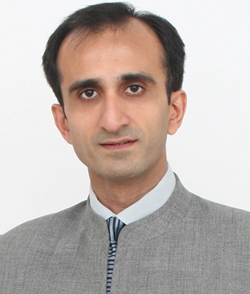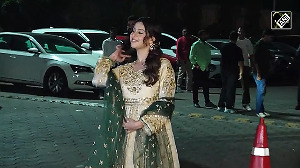 In 2000, he filed a public interest litigation (PIL) against the Board of Control For Cricket in India (BCCI), forcing the mighty body to become more accountable and transparent.
In 2000, he filed a public interest litigation (PIL) against the Board of Control For Cricket in India (BCCI), forcing the mighty body to become more accountable and transparent.
Ten 10 years later, the 36-year-old has taken a whole bunch of administrators across sports to court.
The latest petition, filed in December, includes apex sports bodies like the Indian Olympic Association (IOA), the All India Football Federation (AIFF), Hockey India, the Sports Authority of India (SAI) and a host of other bodies among its respondents.
The reason behind the PIL is simple: displeasure at the manner in which sports is administered in the country.
And the demand is even simpler: these bodies become more transparent regarding the way they function.
In an exclusive interview, litigation lawyer Rahul Mehra tells Special Correspondent Bikash Mohapatra it's a challenge to put himself up against the entire political class, and vows not to give up, come what may.
Brief us about your latest endeavour
This is a PIL against various sporting bodies seeking transparency and accountability. It highlights various issues of perpetuity, such as office-bearers being at the helm of affairs for 20-30 years, and talks about the redundant election system.
It basically maintains that it is impossible to have accountability as long as:
a) Elections remain a farce that they are at present.
b) The system is managed in a way that if there are elections, the electorate can be influenced.
The members aren't professionals but only honorary members, as they like themselves to call themselves.
These people have created their own fiefdom and ensured individuals are bigger than sports despite having never played, or for that matter understood, any sport.
We have given examples of countries like Mexico, Cuba et al and focused on the fact that these countries are doing well because they have invested it right.
What are the main points that you have tried to raise in your petition?
In my petition there are about three to four points that we have tried to raise.
1) It is not possible that these people can be allowed unless they are made accountable. We have requested the courts that they be brought under the Right to Information (RTI) Act.
2) There's a National Sports Policy since 1974-75 -- and it is renewed every five years -- which states no office-bearer is eligible to continue in office for more than two terms. So why is the Government of India funding them for so many years? The Supreme Court has also asked the Government of India to submit an affidavit regarding what it is doing on this issue.
3) Both the ministry and the national sporting federations have failed because there's no focus on the grass roots level. No changes can be produced if the system is not broad-based. Various schemes need to be introduced at the various levels. Don't create white elephants like the Jawaharlal Nehru stadium, but stadiums with 2000-3000 capacities which people can access and which can be used to spot and hone talent. Such infrastructural changes are a necessity.
4) We have also touched upon the issue of how important it is to have a genuine electorate and hold elections in a fair manner. The cronies of the Indian Olympic Association shouldn't be allowed to administer these elections, but the Chief-Election-Commissioner should step in to ensure free and fair polls.
Looking back to your litigation against the BCCI, do you think it achieved the desired objective?
I can only say that I have been instrumental in ensuring that the days of Jagmohan Dalmiya are over.
In 2000, BCCI would say they made a profit of Rs 10 crore per annum.
My argument was why can't the sport -- that is followed by millions in this country -- be sold at a higher price?
It was either because the officials were corrupt or they were incapable -- and in both cases they should be refrained from running the body.
In the last 10 years or so, the BCCI has done that to an extent. The tenders and the processes have been made more transparent.
They have been forced to do many things for players at the domestic levels, like increasing their remuneration to giving them insurance cover. The players have definitely benefited.
I had also argued if it the BCCI is a profit-making body why can't we have a parallel private body?
When the Indian Cricket League (ICL) was launched, Subhash Chandra told me that he had implemented my vision.
We know what happened to ICL thereafter; but isn't the IPL a knee-jerk reaction to the ICL?
But when in an IPL auction, a player (Kieron Pollard) is purchased in a tie-breaker for an undisclosed amount, would you call it transparency?
Beyond a point you can't make any body fully transparent. But, eventually, owing to pressure, the body has to come out clean in the public domain.
I am clear about two things: Firstly, if it is an independent or a private body, like Infosys, then I have no business to ask them a question.
Consequently, if you call yourself a private body but avail IT exemptions, financial grants and subsidies, entertainment tax exemptions, don't pay excise and custom duties -- which are granted by a state government, who have generated it from taxes -- then you aren't what you claim to be.
You have in your functioning assumed the role of a State because you host the teams from other states and no other body can interfere in your work.
In such a case, the State has de facto transferred its power to this body.
But isn't the IPL governing council erring by not having this information in public domain?
It is absolutely wrong. I have been talking about this for a long time now. IPL is a subsidiary of the BCCI and not a private body.
The BCCI has made itself a private body with state functions, and the IPL, being a subsidiary, has simply followed its parent body.
When the Sports Minister says, IPL is running a business and BCCI is promoting it, do you feel vindicated?
I am not a firm believer in the Sports Ministry. They have to take the blame for all the ills that are prevalent in the various sports bodies. The current Sports Minister though has a heart that goes out to sports and sportspersons.
But we need to see how long he is allowed to continue in the office. For there are always positional changes in the name of autonomy.
Despite your displeasure at the way the BCCI functions, would you still admit that cricket is better-administered vis-à-vis the other sports in this country?
I would say cricket is far better managed, far better marketed as compared to other sports in our country. It has, in fact, become a profession today. It's a model that needs to be followed.
But then, again, there's a caveat: Don't have the lust for money. Spend the money you earn to improve facilities for the person who has spent it. Don't put that money back in your account.
The money is there in abundance but the will is lacking.
And you are trying to ensure the same. Do you believe in a legal framework like ours, where justice takes year to come, you will succeed in your endeavour?
I know I won't give up. Sooner or later there's going to be an order in place. I can't quantify that, but it is a matter of time.
If I can do it against the BCCI in four years time, I can certainly do it in case of other sports bodies. The biggest problem is I am now putting myself against the entire political class. To get a political consensus is going to be a difficulty. But therein lies the challenge.





